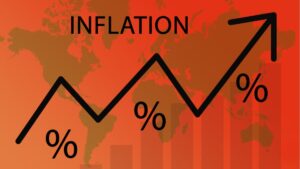
The transmission system operator NPC Ukrenergo announces on Friday, November 11, power outages exclusively on schedule throughout Ukraine, most of all traditionally in the Central and Northern regions.
“The largest volume of restrictions will be introduced in Kyiv, Kyiv, Chernihiv, Cherkasy, Zhytomyr regions,” the company said in a telegram channel on Thursday.
According to the information, the planned shutdown regime will operate from 05:00 to 23:00 in Kyiv, Kyiv, Chernihiv, Cherkasy, Zhytomyr, Sumy, Kharkiv, Poltava and Donetsk regions, from 15:00 to 20:00 in all other regions of Ukraine.
At the same time, the company is reminded of the need to save electricity.
“Please do not turn on several powerful electrical appliances at the same time during the day, especially during peak hours of consumption – from 6:00 to 11:00 and from 17:00 to 23:00,” the NEC urges.

The growth of consumer prices in Ukraine in October 2022 accelerated to 2.5% from 1.9% in September, 1.1% in August and 0.7% in July, the State Statistics Service (Gosstat) reported on Thursday.
In October last year, inflation of 0.9% was recorded, so in annual terms, in October this year, it rose to 26.6% from 24.6% in September, 23.8% in August, 22.2% – according to the results of July and 21.5% – according to the results of June.
Core inflation fell to 1.9% last month from 2.4% in September and 2.1% in August.
Since the beginning of this year, over ten months, consumer prices in Ukraine have increased by 24.8%, while core inflation was 20.1%, the State Statistics Service said.
In mid-October, the National Bank kept its inflation forecast for 2022 at 30%, while the government improved it from 30.1% to 29.3% at the end of October.
In the consumer market in October, prices for food and non-alcoholic beverages rose by 4.2%. Most of all (by 60.5%) eggs have risen in price. Prices for lard, vegetables, fruits, meat and meat products, soft drinks, fish and fish products, cheeses, butter, and milk increased by 11.3-2.3%. At the same time, grain processing products fell in price by 4.8%.
Prices for alcoholic beverages and tobacco products increased by 0.9%, incl. for tobacco products – by 1%, alcoholic beverages – by 0.8%.
Clothing and footwear rose in price by 1.9%, including footwear – by 2.1%, clothing – by 1.7%.
The 1.2% increase in prices in the healthcare sector was primarily due to the increase in the cost of hospital services by 1.8% and outpatient services – by 1.6%.
Transportation prices rose by 0.8%, mainly due to a 1.5% increase in vehicle prices. At the same time, fares in railway passenger transport fell by 5.1%.
As reported, in 2021 inflation in Ukraine rose to 10% from 5% in 2020 and 4.1% in 2019, while core inflation rose to 7.9% against 4.5% a year earlier.

Traders are waiting for inflation data in the U.S. for October, which will be released by the U.S. Labor Department on Thursday at 15:30.
Experts polled by Trading Economics forecast on average a slowdown in consumer price growth in the country to 8% year on year from 8.2% in September.
The U.S. inflation report for October is likely to be a key factor in determining how much the Federal Reserve (Fed) will raise rates at its December meeting.
The market is currently pricing in a 50 basis point (bps) rate hike in December, but a higher-than-expected October inflation rate could shift those expectations in favor of another 75 bps increase, Trading Economics notes.
The ICE-calculated index showing the dynamics of the dollar against six currencies (euro, Swiss franc, yen, Canadian dollar, pound sterling and Swedish krona) is adding 0.28%, while the broader WSJ Dollar is adding 0.33%.
The euro/dollar pair is trading at $0.9950 as of 3:30 p.m. MSC, compared to $1.0014 at market close on Wednesday.
The European Central Bank (ECB) on Thursday took steps to address a shortage of highly liquid government bonds on the market, which are used as collateral in market transactions. The problem has become urgent as the ECB has been buying bonds for years in a row as part of its quantitative easing program.
On Thursday, the ECB decided to increase to 250 billion euros from 150 billion euros the limit for securities lending to financial institutions against cash collateral, said Isabel Schnabel, a member of the ECB’s executive board.
“This is a precautionary measure to alleviate the shortage of securities collateral in the market and keep it functioning at the end of the year,” she wrote on Twitter.
The U.S. currency is at 146.47 yen versus 146.41 yen in the previous session. The pound rose to $1.1392 from $1.1357 the day before.
The dollar/yuan pair is trading at 7.2535 yuan against 7.2419 yuan at the close of the previous session.

Metinvest’s Kametstal plant, established on the facilities of Dniprovsky Iron and Steel Works (DMK, Kamenskoye, Dnipropetrovsk Region), resumed supplies of granulated slag to foreign consumers.
According to the company, Kametstal shipped 19,000 tons of blast-furnace granulated slag to international consumers in October.
It is also noted that the metallurgical products are an economic mainstay of Ukraine. However, even recycled products can bring additional profit to the company. At the moment more than 285 cars of blast furnace slag have already reached their destination in Poland.
Earlier granulated slag was also sent abroad, but supplies had to be suspended because of military operations. The situation with logistics improved in the fall and now the company intends to establish a stable process of its sales to European countries.
The press service explains that granulated slag is produced by rapid cooling of the fiery blast-furnace slag in a water-filled granulated basin. Then the secondary product is taken to a warehouse. From there, special machines are used to move it to the elevated platform and load it into gondola cars for further transportation.
Granulated slag is used, in particular, as aggregate for cement and asphalt concrete, clinkerless viscous concrete, slag-alkali concrete, mineral wool in hydro, agricultural, road construction, in construction of industrial, public and residential buildings, etc.
“Kametstal was created on the basis of PJSC “Dneprovskiy Coke Chemical Plant” (DCCP) and CEC of PJSC “Dneprovskiy Metallurgical Plant” (DMK).
According to the report of the parent company of Metinvest Group for 2020, Metinvest B.V. (Netherlands) owned 100% of DKHZ.
The main shareholders of Metinvest are SCM Group (71.24%) and Smart Holding (23.76%), which jointly manage the company.
Metinvest Holding LLC is the management company of Metinvest group.

As part of measures to combat investment fraud in Kyiv, searches were carried out in call centers, suspects were detained, the Prosecutor General’s Office (PGO) has said.
“On November 8 and 9, 2022, the Prosecutor General’s Office, together with law enforcement officers and international partners, conducted searches in call centers in Albania, Bulgaria, Georgia, North Macedonia and Ukraine, and arrested suspects,” the PGO said on its Telegram channel on Thursday.
According to the prosecutor’s office, the Prosecutor General’s Office, coordinated by Europol and Eurojust, takes part in measures to combat large-scale investment fraud involving hundreds of thousands of victims.
“The suspects belong to an international organized criminal group (OCG) involved in investment fraud using cryptocurrencies. Dozens of call centers in several countries and hundreds of online platforms have been created for this,” the PGO said.
According to the prosecutors, the suspects posed as brokers helping investors make big money with little investment.
“They deceived the victims, gained their trust on the Internet and created call centers. Later, the victims invested funds through web platforms controlled by the criminal organization and lost large amounts of money,” the prosecutor’s office said.
According to investigators, hundreds of thousands of investors around the world suffered from fraud, the damage is estimated at EUR 200 million per year.
According to the report, the cyber fraud investigation began in 2020, including in Ukraine.
“As part of the investigation, searches were conducted in call centers and in the places of residence of the defendants. Suspects who were staying in European countries were detained… a number of searches were made and illegal activities of call centers in Kyiv were revealed. Half a thousand laptops, electronic storage media, surveillance cameras, mobile phones and draft recordings have been seized,” the Prosecutor General’s Office said.

Oil prices began to decline on Thursday, falling for the fourth consecutive session on signals of expanding quarantine restrictions in China.
January futures for Brent on the London ICE Futures exchange by 14:01 Moscow time fell by $0.80 (0.86%) to $91.85 per barrel. Brent quotes fell below $92 per barrel for the first time since the end of October.
Quotes for December futures for WTI in electronic trading on the New York Mercantile Exchange (NYMEX) by that time fell by $0.99 (1.15%) to $84.84 per barrel.
The day before, the price of Brent fell by 2.8%, WTI fell by 3.5%.
China introduces quarantine measures in a number of major cities, including Beijing, amid a jump in the incidence of COVID-19 in the country to the highest level in six months, Bloomberg reports. In particular, the restrictions affected the city of Chongqing with a population of more than 32 million people, which faced the sharpest increase in infections in more than a year.
China is the world’s largest importer of fuel, and market participants fear that lockdowns will put additional pressure on the economy and energy demand in the country, Barron’s notes.
In addition, on Wednesday it became known that US commercial oil inventories increased by 3.92 million barrels last week to 440.76 million barrels. This is a record figure since July 2021. Experts polled by Bloomberg expected an average increase in stocks of only 250 thousand barrels.
Traders are also waiting for the report on October inflation in the US, which will be released on Thursday and may affect the policy of the Federal Reserve. Analysts surveyed by Trading Economics expect a slowdown in inflation last month to 8% from September’s 8.2%.